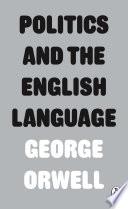Quotes from book
Politics and the English Language

"Politics and the English Language" is an essay by George Orwell that criticised the "ugly and inaccurate" written English of his time and examines the connection between political orthodoxies and the debasement of language.

“Orthodoxy, of whatever colour, seems to demand a lifeless, imitative style.”
Politics and the English Language (1946)

"Politics and the English Language" (1946)
Context: The word Fascism has now no meaning except in so far as it signifies "something not desirable". The words democracy, socialism, freedom, patriotic, realistic, justice have each of them several different meanings which cannot be reconciled with one another. In the case of a word like democracy, not only is there no agreed definition, but the attempt to make one is resisted from all sides. It is almost universally felt that when we call a country democratic we are praising it: consequently the defenders of every kind of regime claim that it is a democracy, and fear that they might have to stop using that word if it were tied down to any one meaning. Words of this kind are often used in a consciously dishonest way. That is, the person who uses them has his own private definition, but allows his hearer to think he means something quite different. Statements like Marshal Petain was a true patriot, The Soviet press is the freest in the world, The Catholic Church is opposed to persecution, are almost always made with intent to deceive. Other words used in variable meanings, in most cases more or less dishonestly, are: class, totalitarian, science, progressive, reactionary, bourgeois, equality.

"Politics and the English Language" (1946)
Context: Never use a metaphor, simile, or other figure of speech which you are used to seeing in print. Never use a long word where a short one will do. If it is possible to cut a word out, always cut it out. Never use the passive voice where you can use the active. Never use a foreign phrase, a scientific word, or a jargon word if you can think of an everyday English equivalent. Break any of these rules sooner than say anything outright barbarous.

“Break any of these rules sooner than say anything outright barbarous.”
"Politics and the English Language" (1946)
Context: Never use a metaphor, simile, or other figure of speech which you are used to seeing in print. Never use a long word where a short one will do. If it is possible to cut a word out, always cut it out. Never use the passive voice where you can use the active. Never use a foreign phrase, a scientific word, or a jargon word if you can think of an everyday English equivalent. Break any of these rules sooner than say anything outright barbarous.

"Politics and the English Language" (1946)
Context: The word Fascism has now no meaning except in so far as it signifies "something not desirable". The words democracy, socialism, freedom, patriotic, realistic, justice have each of them several different meanings which cannot be reconciled with one another. In the case of a word like democracy, not only is there no agreed definition, but the attempt to make one is resisted from all sides. It is almost universally felt that when we call a country democratic we are praising it: consequently the defenders of every kind of regime claim that it is a democracy, and fear that they might have to stop using that word if it were tied down to any one meaning. Words of this kind are often used in a consciously dishonest way. That is, the person who uses them has his own private definition, but allows his hearer to think he means something quite different. Statements like Marshal Petain was a true patriot, The Soviet press is the freest in the world, The Catholic Church is opposed to persecution, are almost always made with intent to deceive. Other words used in variable meanings, in most cases more or less dishonestly, are: class, totalitarian, science, progressive, reactionary, bourgeois, equality.